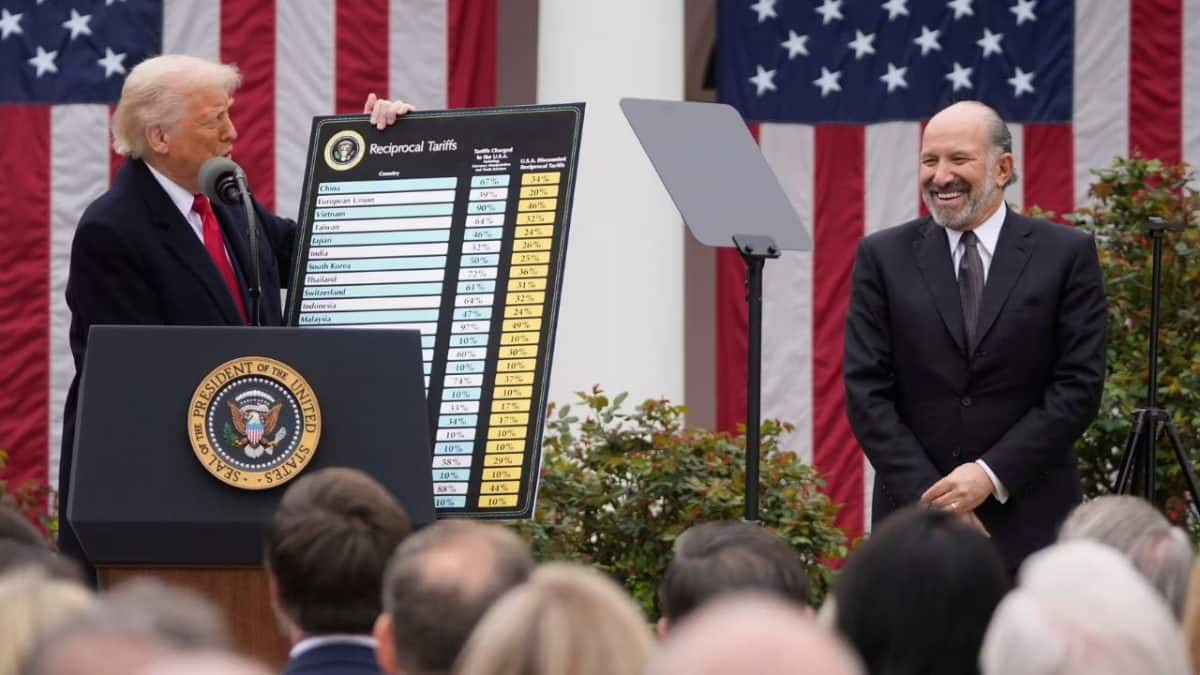What is the story about?
US Commerce Secretary Howard Lutnick’s recent warning that India, Brazil and Switzerland need to be “fixed” if they want trade deals with Washington is more than undiplomatic. It is offensive and ignorant, with a hidden sense of insecurity and isolation. It reeks of a colonial mindset that believes nations can be disciplined into line by threats. India is not a problem for America to repair. We are a sovereign power, a trillion-dollar economy, and a rising pole in world politics. No more decision takers but decision makers. New Delhi will never take diktats from anyone, however powerful.
The assumption behind the statement is that tariffs and bullying will break India’s resolve. That is a misreading of history. India has resisted empires, sanctions, and pressure campaigns for decades. The tougher the pressure, the stronger India’s instinct to stand firm. Today, India is not looking back but moving forward to its destination of Viksit Bharat, both with purpose and resolve in the spirit of multilateralism and the Indian Sanskrit Maha Upanishad philosophical concept "Vasudeva Kutumb", meaning "the world is one family" or "One Earth, One Family, One Future".
Colonial Hangover on Display
The language used by Lutnick sounded less like a commerce secretary and more like a mafia boss. “Play ball if you want to sell to US consumers” is not the vocabulary of a partner. It is the vocabulary of intimidation. India cannot and will not respond to such arrogance.
For Washington, this style of rhetoric may work at home, where chest-thumping appeals to domestic politics. But when used abroad, it only creates resentment – Make America Great Again (Maga) to Make America Hate Again (Maha). India, like any sovereign nation, conducts trade and diplomacy on the basis of interest and dignity, not fear. Strategic autonomy is not for sale.
India is a Profit Engine for America
What Lutnick also ignored is that American business gains enormously from India. The Indian market is not a one-way street. US companies make tens of billions of dollars every year here. Tech giants like Google, Microsoft, Apple, Meta, and Amazon have made India one of their largest growth zones.
American financial firms, consultancy houses, and defence suppliers earn heavily from Indian contracts. Students from India alone pump more than 25 billion dollars annually into US universities. Add intellectual property fees, tech services, and market profits, and the figure climbs beyond 80 billion dollars flowing from India to America each year.
So let us be clear. India does not drain America. India fuels American profit. To talk of “fixing” India while raking in that kind of money is hypocrisy.
Trade is a Two-Way Street
Yes, India maintains a trade surplus with the United States. Last year, India exported more than 86 billion dollars’ worth of goods and imported 45 billion. That left a surplus of 41 billion. But that number is only one part of the story.
The United States is also the third-largest investor in India, with cumulative FDI crossing 70 billion dollars. Apple is shifting its supply chains to India. Amazon has invested billions in warehousing. JPMorgan, Goldman Sachs and other firms employ thousands of skilled Indians.
Trade balances do not define exploitation. They define opportunity. Both sides benefit. To reduce a complex relationship to a complaint about tariffs or deficits is shallow economics and shallow politics.
Autonomy is Non-Negotiable
India’s economic and foreign policy rests on one clear foundation: autonomy. We take decisions on the basis of national interest, not foreign pressure. That is why India continues to buy energy from Russia despite criticism. It is why we diversify defence procurement. And it is why we insist on fair access to our market rather than opening the gates blindly.
Energy security for 1.4 billion people cannot be decided in Washington. Trade priorities for a country of India’s size cannot be set in another capital. We welcome partnerships, but we do not take orders.
Equal Partners, Not Subordinates
America is one of the partners for India. They need India as much as, if not more than, India needs the US in the present geopolitical churn. Thus, if the US, for its own good, wants enduring relations with India, it will have to leash its arrogance and psychopaths and language of coercion. It must realise India is the largest and oldest democracy and must find more constructive and amicable ways to converge interests in technology, Indo-Pacific security and counter-terrorism. But that requires respect and equitable partnership.
Patronising lectures or veiled threats destroy trust. They make cooperation harder, not easier. The reality is simple: India is not a subordinate in this relationship. We are not looking for patronage. We are looking for equal ground.
Multipolar Reality
The global order is shifting, and India is today playing a major role in shaping that transition. India’s foreign policy of multi-alignment is evolving in pursuit of its national interest. In the coming decades, it may take the form of what can be called hetero alignment. It works with Russia and China in RIC, leads Brics, partners with Brazil and South Africa in the India-Brazil-South Africa Dialogue Forum (IBSA), and engages with China on climate. At the same time, it voices the concerns of the Global South while leading in the G20. Engagement with Eurasia, Africa, the Gulf, and Southeast Asia has also been elevated.
Foreign pressure only drives India to diversify further. Already, Russia has underlined that India–Russia ties remain untouched by US posturing. Moscow openly praised India’s self-respect in resisting external pressure. Such statements resonate here because they echo what most Indians feel: dignity comes first.
The Message from New Delhi
India will never accept being described as something to be “fixed”. That language belongs to another century. Our trade policy, our strategic choices, and our diplomacy are all shaped by national interest. They are not for sale.
Tariffs, threats or insults will not change this position. What will work is dialogue based on equality. Respect, not reprimand. Partnership, not patronage.
The choice is America’s. Either recognise India’s stature and engage accordingly, or continue with outdated arrogance and watch New Delhi chart its own independent path. India has the strength, confidence and leverage to do so.
Washington must understand this: India is not a pawn on someone else’s chessboard. We are a player in our own right. And we are here to stay.
The author is former Director General, Mechanised Forces. Views expressed in the above piece are personal and solely those of the author. They do not necessarily reflect Firstpost’s views.
The assumption behind the statement is that tariffs and bullying will break India’s resolve. That is a misreading of history. India has resisted empires, sanctions, and pressure campaigns for decades. The tougher the pressure, the stronger India’s instinct to stand firm. Today, India is not looking back but moving forward to its destination of Viksit Bharat, both with purpose and resolve in the spirit of multilateralism and the Indian Sanskrit Maha Upanishad philosophical concept "Vasudeva Kutumb", meaning "the world is one family" or "One Earth, One Family, One Future".
Colonial Hangover on Display
The language used by Lutnick sounded less like a commerce secretary and more like a mafia boss. “Play ball if you want to sell to US consumers” is not the vocabulary of a partner. It is the vocabulary of intimidation. India cannot and will not respond to such arrogance.
For Washington, this style of rhetoric may work at home, where chest-thumping appeals to domestic politics. But when used abroad, it only creates resentment – Make America Great Again (Maga) to Make America Hate Again (Maha). India, like any sovereign nation, conducts trade and diplomacy on the basis of interest and dignity, not fear. Strategic autonomy is not for sale.
India is a Profit Engine for America
What Lutnick also ignored is that American business gains enormously from India. The Indian market is not a one-way street. US companies make tens of billions of dollars every year here. Tech giants like Google, Microsoft, Apple, Meta, and Amazon have made India one of their largest growth zones.
American financial firms, consultancy houses, and defence suppliers earn heavily from Indian contracts. Students from India alone pump more than 25 billion dollars annually into US universities. Add intellectual property fees, tech services, and market profits, and the figure climbs beyond 80 billion dollars flowing from India to America each year.
So let us be clear. India does not drain America. India fuels American profit. To talk of “fixing” India while raking in that kind of money is hypocrisy.
Trade is a Two-Way Street
Yes, India maintains a trade surplus with the United States. Last year, India exported more than 86 billion dollars’ worth of goods and imported 45 billion. That left a surplus of 41 billion. But that number is only one part of the story.
The United States is also the third-largest investor in India, with cumulative FDI crossing 70 billion dollars. Apple is shifting its supply chains to India. Amazon has invested billions in warehousing. JPMorgan, Goldman Sachs and other firms employ thousands of skilled Indians.
Trade balances do not define exploitation. They define opportunity. Both sides benefit. To reduce a complex relationship to a complaint about tariffs or deficits is shallow economics and shallow politics.
Autonomy is Non-Negotiable
India’s economic and foreign policy rests on one clear foundation: autonomy. We take decisions on the basis of national interest, not foreign pressure. That is why India continues to buy energy from Russia despite criticism. It is why we diversify defence procurement. And it is why we insist on fair access to our market rather than opening the gates blindly.
Energy security for 1.4 billion people cannot be decided in Washington. Trade priorities for a country of India’s size cannot be set in another capital. We welcome partnerships, but we do not take orders.
Equal Partners, Not Subordinates
America is one of the partners for India. They need India as much as, if not more than, India needs the US in the present geopolitical churn. Thus, if the US, for its own good, wants enduring relations with India, it will have to leash its arrogance and psychopaths and language of coercion. It must realise India is the largest and oldest democracy and must find more constructive and amicable ways to converge interests in technology, Indo-Pacific security and counter-terrorism. But that requires respect and equitable partnership.
Patronising lectures or veiled threats destroy trust. They make cooperation harder, not easier. The reality is simple: India is not a subordinate in this relationship. We are not looking for patronage. We are looking for equal ground.
Multipolar Reality
The global order is shifting, and India is today playing a major role in shaping that transition. India’s foreign policy of multi-alignment is evolving in pursuit of its national interest. In the coming decades, it may take the form of what can be called hetero alignment. It works with Russia and China in RIC, leads Brics, partners with Brazil and South Africa in the India-Brazil-South Africa Dialogue Forum (IBSA), and engages with China on climate. At the same time, it voices the concerns of the Global South while leading in the G20. Engagement with Eurasia, Africa, the Gulf, and Southeast Asia has also been elevated.
Foreign pressure only drives India to diversify further. Already, Russia has underlined that India–Russia ties remain untouched by US posturing. Moscow openly praised India’s self-respect in resisting external pressure. Such statements resonate here because they echo what most Indians feel: dignity comes first.
The Message from New Delhi
India will never accept being described as something to be “fixed”. That language belongs to another century. Our trade policy, our strategic choices, and our diplomacy are all shaped by national interest. They are not for sale.
Tariffs, threats or insults will not change this position. What will work is dialogue based on equality. Respect, not reprimand. Partnership, not patronage.
The choice is America’s. Either recognise India’s stature and engage accordingly, or continue with outdated arrogance and watch New Delhi chart its own independent path. India has the strength, confidence and leverage to do so.
Washington must understand this: India is not a pawn on someone else’s chessboard. We are a player in our own right. And we are here to stay.
The author is former Director General, Mechanised Forces. Views expressed in the above piece are personal and solely those of the author. They do not necessarily reflect Firstpost’s views.
























